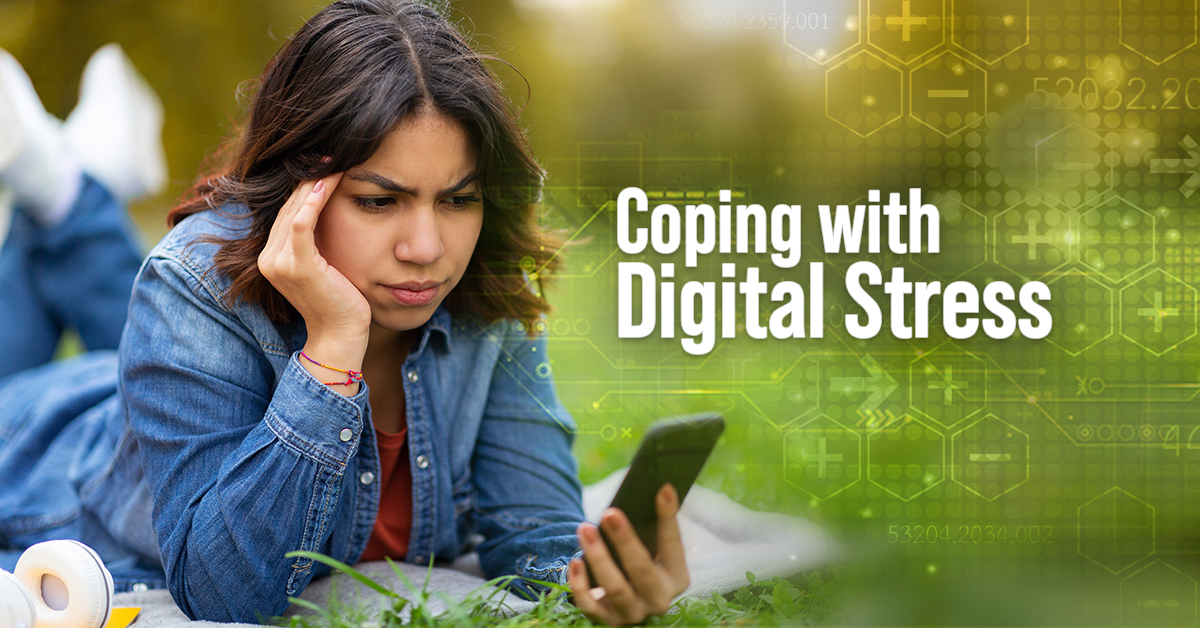
It’s the year 2023, and it’s easy to say that the digital world is here to stay. So how do we cope with it? It is everywhere, always surrounding us - I mean, here you are reading this blog on a device! There are so many beautiful ways the digital age brings us connection, information, education, entertainment, and more. However, it is important to be aware of the negatives this digital age brings. With all these components in mind, we can find ourselves feeling stressed or overwhelmed from the information overload and screen time ever increasing. Let’s dive into what is digital stress and how to cope with it.
Digital stress, also known as technology-related stress, is the emotional or psychological strain caused by the constant use of digital devices or being constantly connected to the internet. Symptoms can include anxiety, depression, insomnia, and physical symptoms such as headaches and eye strain. It is important to take breaks from technology and practice self-care to minimize digital stress.
There can be various causes of digital stress such as information overload, FOMO (Fear of Missing Out), comparing yourself to others, social anxiety, not living in the present moment, and so much more. This generation and the new digital age is the most connected than ever before because of the internet - then why is there an increase in anxiety, depression, and loneliness? Let’s look at the pros and cons of all of this.
Pros and Cons of the Digital World
Pros:
- Instant communication with people all over the world
- Access to vast amounts of information
- Convenience in doing everyday tasks such as shopping, banking, and entertainment
- Opportunities for remote work and learning
- Ability to connect with like-minded individuals and communities
Cons:
- Over-reliance on technology can lead to addiction and mental health issues
- Increased risk of cyberbullying, online harassment, and identity theft
- Spread of misinformation and fake news
- Decreased face-to-face communication and social skills
- Negative impact on the environment due to e-waste and energy consumption
Ways to Cope with Digital Stress
- Set Boundaries and Time Limits for Yourself
There are now settings in your phone where you can add time limits to certain apps! It basically works where you set an allotted time amount for an app and then once you hit that screen time on your phone, it locks you out for the day. It can also be as simple as just making agreements with yourself to follow every day. We have all been there, endlessly scrolling out of boredom, and then we find ourselves hours later in the same position, still mindlessly scrolling. Setting boundaries with yourself can help fix this!
- Customize Your Notifications & Settings (modes)
Specifically on iPhones, there is a setting called “modes” where you can select to put your phone in ‘do not disturb’ mode, for example. In this mode, your phone hides all of your notifications, so as to not disturb or distract you. Not having your notifications nagging at you can really help put some distance between yourself and the screen! This can even help further the boundaries you have set for yourself.
- Protect Yourself against Blue Light
Blue light can affect our sleep patterns by suppressing the production of melatonin, the hormone that regulates sleep. It can also cause eye strain, headaches, and vision problems with prolonged exposure. To protect against blue light, you can try using blue light-blocking glasses, adjusting the color temperature settings on your electronic devices, taking regular breaks from screen time, and limiting your exposure to electronic devices before bed.
- Practice Self Care and Mindfulness
Being involved in so much virtual reality can really distance you from ‘real world’ reality. We can find ourselves stuck in a virtual space, and not really present in the moment. Practicing self-care and mindfulness can really help us come back into our own bodies, and out of our screens. Remembering to take breaks when needed, meditate, engage in activities that bring you joy, prioritize sleep, and so much more can help us with this task.
Now recognizing, understanding, and having the self-awareness of the effects that come with digital stress - you have a tool belt to help you get back to a place of homeostasis.


